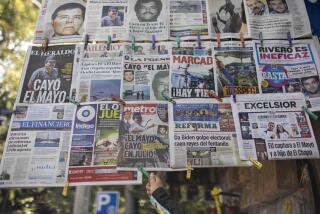Prosecutors Put Pressure on Noriega’s Cronies : Trial strategy: Testimony of other defendants may boost a case that could be hampered by national security problems.
- Share via
MIAMI — Seeking to strengthen their case against deposed Panamanian dictator Manuel A. Noriega, federal prosecutors are stepping up pressure on some of his co-defendants to testify against him about their alleged drug-trafficking conspiracy.
The prosecution believes that the testimony of other defendants, who would be allowed to plead guilty to reduced charges, would be an important boost to a case that may be hampered by problems over the disclosure of sensitive national security documents.
“The case against Noriega is going to be a lot stronger, but they’re going to be cutting deals with a helluva lot of devils,” one law enforcement source said. Another source, who asked to remain anonymous, said that prosecutors “are using the usual argument that the first ones to come in will get the best deals.”
Five co-defendants in the Miami drug-trafficking indictment against Noriega are under arrest and facing prosecution. The most important is Luis A. del Cid, a close Noriega associate and former lieutenant colonel in the Panama Defense Forces.
Del Cid, who surrendered to authorities on Christmas Eve after U.S. forces moved in on his troops in Panama’s Chiriqui province, faces a possible 70-year prison term if convicted on racketeering, drug-trafficking and conspiracy charges. He is accused of acting as Noriega’s liaison with Colombia’s notorious Medellin cocaine cartel.
Del Cid’s U.S. lawyer, Sam Burstyn, was unavailable for comment Friday on his client’s case. But one legal source said that the former military commander “is bright enough to want to listen” to a plea bargain offer.
Besides Del Cid, other co-defendants in custody are Daniel Miranda and Eduardo Pardo, two pilots accused of hauling cocaine money from the United States to Panama; William Saldarriaga, an accused Colombian narcotics trafficker, and Brian Alden Davidow, an alleged Miami cocaine distributor who allegedly met with Noriega to arrange shipments to South Florida.
The trials of Saldarriaga and Davidow, apprehended long before last month’s invasion of Panama, are scheduled to begin later this month.
Michael O’Kane, an attorney for Miranda, said prosecutors presumably are putting more pressure on Del Cid than they are on his client, who is considered a relatively minor figure. But O’Kane said he is not seeking a plea agreement for Miranda because prosecutors are facing many legal problems with the case.
“Everybody in this case is going to win,” he said. “Gen. Noriega is going to win.”
A defense attorney who declined use of his name said that he agreed with O’Kane, but added: “If the government said they’d recommend probation for my client, that would be hard to turn down.”
Richard Sharpstein, who is Davidow’s lawyer, said that with Noriega’s capture, the government is bound to obtain more evidence even if no plea agreements are reached.
“The informants will fall like pineapples from a tree now that Noriega is in custody,” Sharpstein said.
Meanwhile, Steven Kollin, one of Noriega’s lawyers, discounted a published report that the Justice Department might consider a plea agreement with Noriega if he were willing to provide extensive information on international drug-trafficking operations.
“A man who is innocent is not receptive to a plea bargain,” said Kollin in remarks to reporters after conferring with his client.
He said that he is planning to proceed to trial “if we can find 12 people with an open mind” on Noriega. Kollin previously has protested that it will be “nearly impossible” for Noriega to obtain a fair trial in view of the pervasive publicity about his alleged drug trafficking.
Noriega remained under heavy guard Friday in a basement cell in the federal courthouse here. Officials would not rule out the possibility that he could be moved for even greater security to a nearby military base.
Times staff writer Ronald J. Ostrow in Washington contributed to this story.
More to Read
Sign up for Essential California
The most important California stories and recommendations in your inbox every morning.
You may occasionally receive promotional content from the Los Angeles Times.













